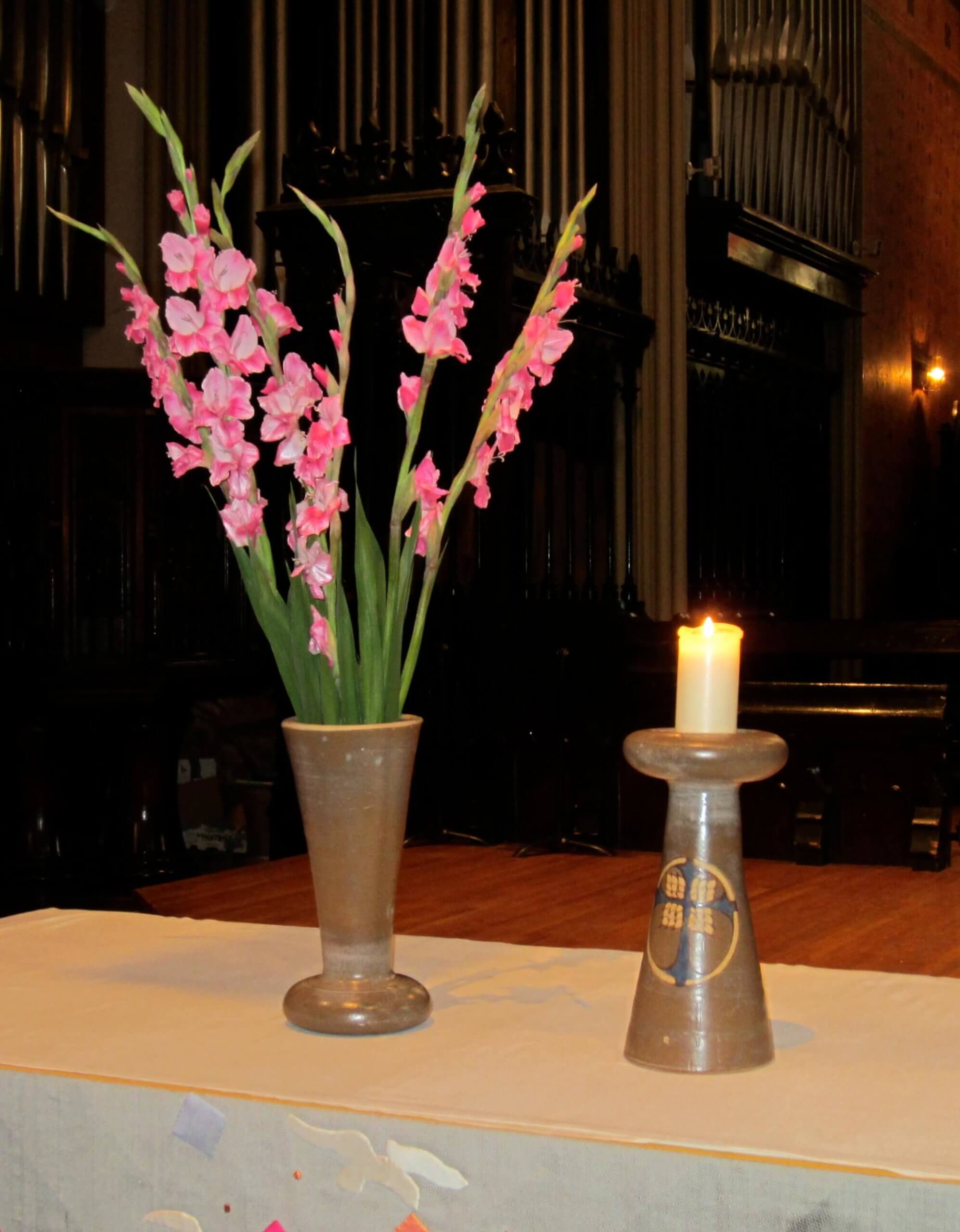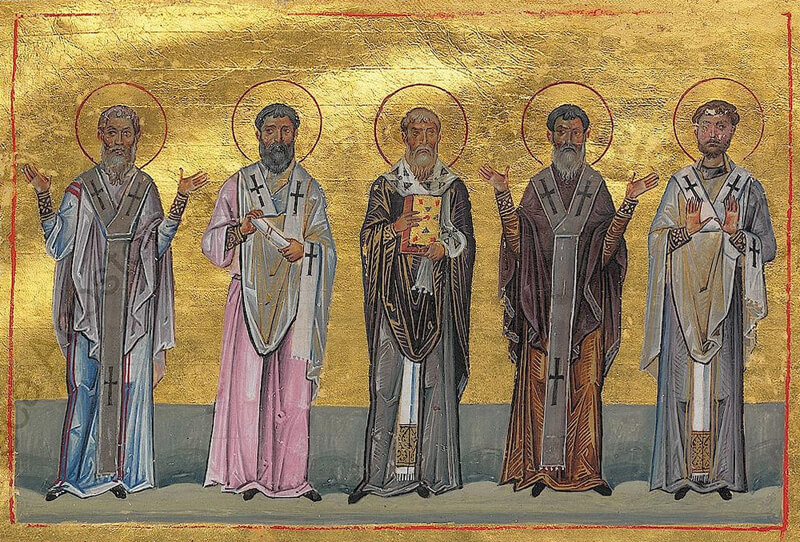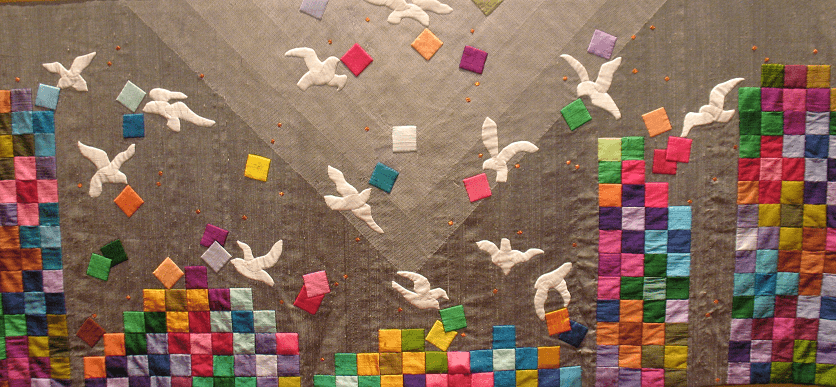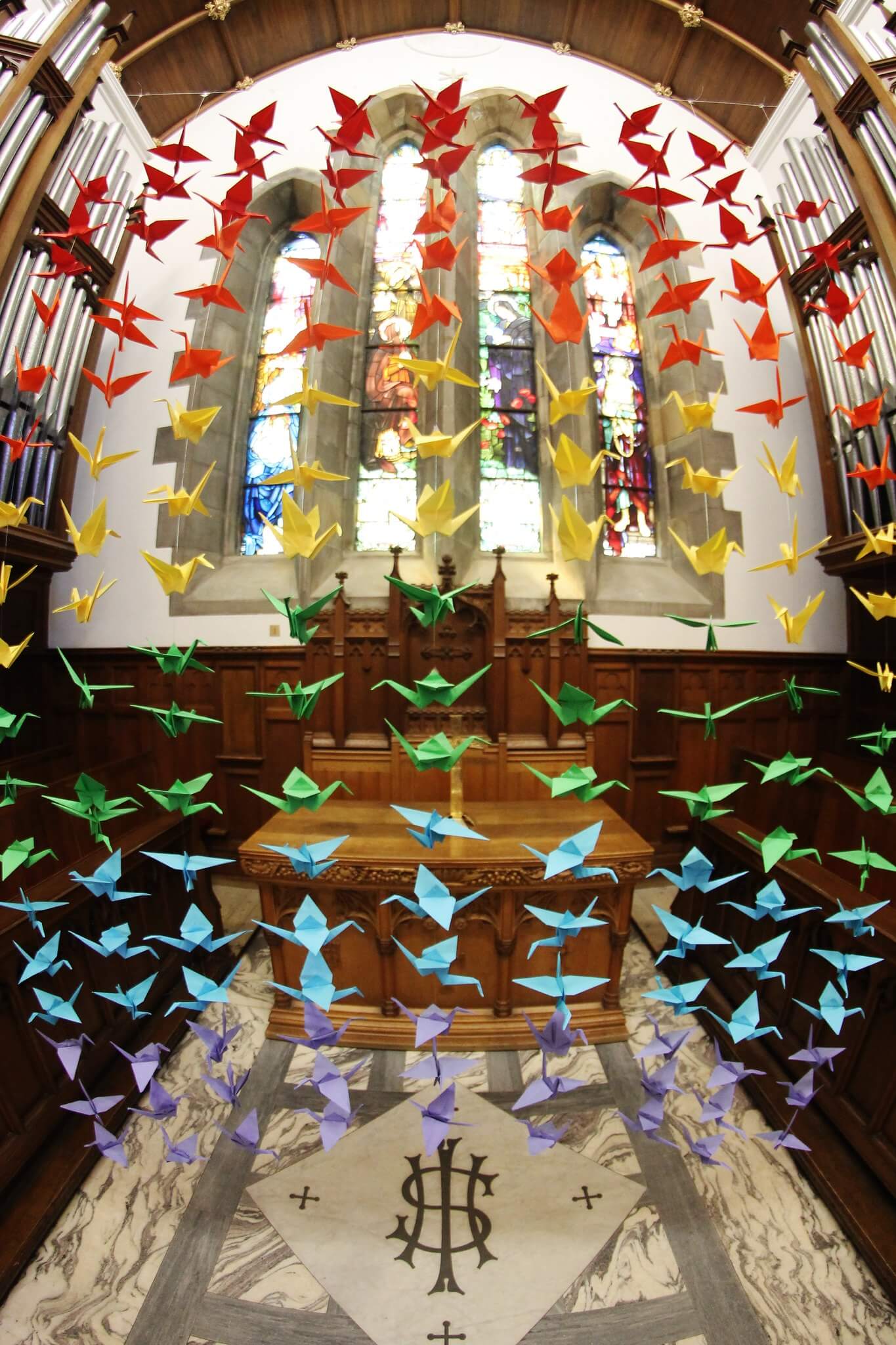Shaped for Mission
Sherman Hesselgrave
Readings: Jeremiah 18:1-11 Psalm 139 Philemon 1-21 Luke 14:25-33
The main point of today’s homily will be to assert that Jesus, through his public ministry and the coaching of his disciples was shaping them for mission. St Paul continued this practice in his missionary work, and the Hebrew prophets also passed along God’s messages to instruct the people of God to shape up. Now, the word ‘mission’ gets tossed around to the point that it almost seems like meaningless church jargon at times. But thanks to my Latin teacher in grade nine, I know that the English word ‘mission’ comes from ‘mittere,’ to send. Not long ago, we had the story of Jesus sending out the 70 (or 72 disciples, depending on textual variants) to tell people that the reign of God was right on top of them, and to give them an opportunity to learn about it. For decades, Christian churches have been going through the wrenching discovery that the way things worked in the past don’t work so well anymore. A church that communicates the message that “We’re open Sundays, y’all come, if you want”, is a church that probably is well on its way to being de-commissioned. Mission involves engaging in the world by looking around for the hurts, and doing something concrete to heal them, as Jesus and others in our scriptures showed us. There is nothing passive about it. We gather here for spiritual nourishment and encouragement, and, if you will, to be formed or shaped into the disciples we have been called to become, but the mission field is out there, beyond our doors.
The Hebrew prophet Jeremiah in today’s reading, like Isaiah before him, uses the image of God as potter to get our attention. “Can I not deal with you, O Israel, just like potters deal with their clay? For you are clay in my hands, O house of Israel.” Any one who has watched a potter work, knows the infinite variety of shapes into which a lump of clay can be fashioned, and re-fashioned. The theme of judgment in the reading stems from the house of Israel not living into the purpose God shaped them for; they had become useless vessels. Every human being, according to the Creation story in Genesis has been given the radical freedom to choose what we will do with what God has given us. Any one of us has the freedom to do exactly what the house of Israel is accused of by Jeremiah: not using our unique giftedness to help create a society that works the way God would have it work, a society of justice, mercy, and shalom.
When I was in seminary, the church I was assigned to had an annual auction, and at one of these auctions I bought a set of ecclesiastical candlesticks made by a gifted potter, Sasha Makovkin. There are a few things you should know about Sasha before I continue. John Killinger met him in the late 80s and wrote this about him in a sermon:
Sasha’s uncle was the dean of St. Basil’s Russian Orthodox Church, the great landmark on Red Square in Moscow. During the revolution that created the Soviet state, the soldiers carried all the icons from the church and threw them onto the pavement in the square. They offered the dean a bargain: if he would walk on the icons, denouncing his faith, they would permit him to live; if he would not, they would shoot him. For many years, Sasha did not understand why his uncle refused and died for his belief. Why would anyone hold belief dearer than life?
[Sasha’s family moved to the United States, and Sasha ended up in Mendocino, California.]
Then, while leading a pottery workshop for a local Presbyterian church, Sasha began to read the Gospel of John. Over and over, he felt confronted by the challenge to believe in Christ….
“More than eighty times,” said Sasha. “More than eighty times it says we must believe. I could not get away from its insistence. At last, I had to surrender to Christ.”
At last, too, Sasha understood about his uncle. There are some beliefs that shape one’s attitudes so completely that one will even die for them. [“Belief: You Are What You Believe,” http://www.preaching.com/sermons/11563596/ Pages 3 and 4]
Several times I was fortunate to watch and hear Sasha preach, perched on a stool at his potter’s wheel, on a large sheet of plastic in the middle of the church. He would talk as he threw, telling a story as he turned a mound of clay into something beautiful, and then he would take the formed pot and smash it into a lump of clay and create a different shape with a different story.
So back to my candlesticks, which normally live on the buffet in my dining room, a fitting place for them because, as I understand it, every meal is holy, not only the Eucharist. Bill Countryman, in his book, Calling on the Spirit in Unsettling Times (Church Publishing, 2012), writes:
It may have been Archbishop William Temple who once said, with reference to the Eucharist, that the bread on the altar could not be holy if all bread were not holy, and we could not know that all bread is holy without seeing that the bread on the altar is holy. The bread of the Eucharist does not monopolize holiness; it calls our attention to itself so that it can send our attention back out to the bread of the world, which is holy because it maintains life. [p. 27]
See how the liturgy shapes us for mission beyond our doors by showing us a deeper way to look at the common things we encounter every day. Many of us pray every day the words “Give us today our daily bread.” This petition is really a prayer that everyone will be given sustenance for today.
One of the things I discovered after winning my Makovkin candlesticks at the St John’s auction, was that their design made it possible for them to also serve as vases, as they were glazed on the inside as well—a metaphor for way God shapes us to be flexible in the ministry and mission we may be called to. We may think we don’t have what it takes to do something we’ve never tried, and then someone (maybe even the Holy Spirit) cajoles us into trying that thing, and suddenly the candlestick in us has become a vase.
There is another story of being shaped for mission in Paul’s letter to Philemon. Paul is in prison, possibly in Ephesus, and there he meets a runaway slave, Onesimus, whose name in Greek means ‘useful,’ who belongs to Philemon, someone converted by Paul and who is a leader of a house church (thought to be in Colossae). While in prison, Onesimus has also been converted by Paul and has become very close to Paul. It is an awkward thing that Paul is asking of Philemon in his appeal that he take back Onesimus, “no longer as a slave, but as something much more—as a dear brother” in Christ. And there is a huge risk for Onesimus, because in the Roman Empire runaway slaves could be put to death, if the owner wanted. But Paul, in his appeal, one follower of Christ to another, tries to make his friend understand that all Christians—equally—are servants of Christ. In his letter to the church at Colossae, Paul writes: “Masters, treat your slaves justly and fairly, for you know that you also have a Master in heaven.” [Colossians 4:1] Paul sees Onesimus as a very useful member of the new community of faith, someone who will help to spread the good news that God had now equipped him to share. We are not told the outcome of the situation, but we can hope that Onesimus’ sending resulted in something other than the punishment and degradation that the law allowed, that Philemon took Paul’s appeal to heart and did something no one in his social circle would have considered proper, but was something that flowed from the new belief system he had claimed in his baptism.
And thirdly, we encounter Jesus, who is being followed by large crowds, drawn by his charismatic acts. He explains to them in brutally clear terms the conditions for discipleship. Some of the language seems harsher in English than in the original language (the Greek word translated as ‘hate’ does not come with the same emotive content as the English). But still, saying that “If you come to me and you do not hate your father, mother, brother, sisters, [husband or] wife, your children—even your own life—you cannot be my disciple” must have caught many of his followers up short. The summary in verse 33, “…if you yourself do not say farewell to all your possessions, you cannot be my disciple” has caused me to think of these conditions more in the way that Buddhism speaks of “attachments.” Jesus requires that we give up any and all attachments that would or could get in the way, or compromise, the mission and ministry we have been shaped for. Sasha Makovkin’s uncle could not have refused to walk across those icons strewn across Red Square if he had not let go of all attachments that might have made him take the way out. Just as Kazantzakis, in The Last Temptation of Christ, demonstrated that Jesus, too, had a choice at the end to escape crucifixion, but instead chose to follow through with what he had spent his entire public ministry preaching and teaching: that to be a disciple who has been sent into the world to spread the news of the reign of God and to invite others to commit to living its values included the requirement that one be willing to walk the way of the cross, to give one’s life for one’s beliefs.
I spent Friday evening and yesterday afternoon at Soulpepper Theatre’s production of Tony Kushner’s award-winning play, Angels in America: A Gay Fantasia on National Themes. The play, set in New York City in 1985 as the AIDS crisis escalated, is in two three-hour parts, the first entitled Millennium Approaches. (That would be Millennium with a capital M, the biblical reference to the end-times, not the looming 2000.) Part Two is entitled Perestroika, the reference to the political movement for reformation within the Communist Party of the Soviet Union under Mikhail Gorbachev. The word literally means ‘restructuring.’
As the background notes in the program inform us, “Kushner fearlessly explores and exposes the intersections of love and hate, religion and belief, the personal and the political in a robustly imagined community of souls in New York City at the end of the last century.” They go on to say, that “When Angels came out its epic, ambitious reach and frank examination of sex and homosexuality shocked some. Multiple perspectives are interwoven, overlap, and blend into one another, certain actors play several characters, expected gender roles are reversed. Some critics said the plays were too liberal: they accused Kushner of preaching to the choir and he didn’t deny it.” In response to his critics, he wrote: “The role of the preacher is…to help the faithful grapple with doubt. You go to the edge of what you’re certain about. You ask the congregation to come with you…no candle no map..you ask them to explore the darkness with you.”
In the lobby there is a large display that everyone entering the theatre has to pass by. It is a chronology of the response to the AIDS crisis in Toronto. It starts in 1982 when the syndrome was first defined, and it mentions a coalition of groups that rallied to create a place where people suffering from AIDS would be taken care of at the end of their lives at a time when there was no cure. That place would become Casey House. Several groups are mention as part of that first coalition, including the Toronto Hospice, St Michael’s Hospital, June Callwood, and “representatives from Holy Trinity Church.” I have to confess that I felt a burst of pride for this community for being part of that effort to lay a foundation. That was the same year I began seminary in Berkeley, California, and I recall a two-pane “then and now” editorial cartoon in the San Francisco Chronicle around that time that depicted in the first frame Jesus healing a leper, and in the other, the televangelist Jerry Fallwell proclaiming AIDS as God’s judgment on homosexuals. The shaping for mission at Holy Trinity that happened in this instance was no accident. It happened over time by the Spirit’s acting through members of this community—the same Spirit that is here today to shape each of us into the vessels of God’s grace that God created us to be.
We continue to be shaped for mission in a variety of ways. Recently, Jessica Howsam and Jeff Scholl, recent college graduates, found their way to Holy Trinity, and inquired about ways to become connected. Were there any small groups they could join? I had to confess that we have done small groups during Lent or Advent, but that we didn’t have any ongoing groups for newcomers to plug into. Then I had an email from them, asking to meet over coffee to present a proposal for a small group that would meet in their home, an opportunity for people to gather to explore the question: “What is faithful witness in Toronto?” As you heard in their announcement this morning, they are ready to get started.
We are called to be God’s heart and mind and hands in the world, and God is continually inviting us to be shaped for mission in the world and for ministry through our community. We can accept the invitation or we can let our attachments to other things make us hesitant to take the plunge, to go to the edge of our certainties and together explore the unknown that God has in store for us.







